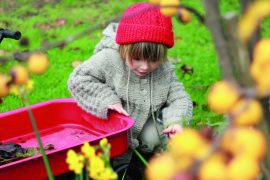In those most difficult, blood pressure-raising, infuriating moments, when I want to yell and send them to their rooms, showing empathy IS the most difficult thing to do in the moment. I know in my heart I can make it all go away if I just walk across the room and wrap my arms around them and say, “I’m sorry you are having a hard time right now.”
Before you say I’m rewarding them for their bad behavior, I counter that with the awareness that bad behavior is a symptom of an underlying issue. It is because they literally, developmentally do not have control of their emotions or healthy coping skills to deal with big feelings. Shoot, I’m 41 years old and I’m still learning healthy coping skills when I’m dealing with big emotions. I hope so much better for my kids, that they won’t still be struggling at my age.
These are all developmentally appropriate behaviors of a child whose brain functions are not fully developed. These are all opportunities for the adults to model good coping skills like communication, empathy, kindness, connection. Show them: this is how it’s done. This is how we take care of each other. This is real life.
The trouble with punishment is that it speaks to the selfish nature of humans. If I am stopping myself from a behavior just to avoid getting in trouble, this is a self-serving action. There is no intrinsic motivation to be a good person and do the right thing. If a child stops a tantrum by threat of losing their iPad, this doesn’t teach the child healthy ways to express themselves. There is no motivation for the child to think of how their behavior affects others. When we muddle a child’s brain with fear of punishment and feelings of shame, we take away from them the opportunity to truly understand how their actions impact others. Punishment makes children feel angry, ashamed, and out of control. They aren’t thinking about how the other person feels, I promise you that. Punishment hurts. What do hurt people do? They hurt people.
Studies show that punishment actually increases aggression in children:
“Decades’ worth of research shows that punishment – even when it doesn’t include physical force – promotes aggression. But studies conducted in the United States and in Sweden revealed another layer to that reality: Bullies in particular are more likely to have been raised by authoritarian parents who rely on punishment.” (Published in Print: September 7, 2016, as Bullying the Bully: Why Punishment Doesn’t Work)
The alternative? We can try sitting with our child and quietly connecting, teaching, and empathizing. Help them to put words onto their feelings and the feelings of the people around them. When your child takes a toy from a friend or sibling, “I know you want that toy. It is hard to wait when something looks so fun! Right now we have to find something different to play with.” Remember that it’s perfectly normal child development for a young child to see something and assume that because they want it, they should have it. “Look at Zoe’s face. She is sad that you took her toy.”
When we muddle a child’s brain with fear of punishment and feelings of shame, we take away from them the opportunity to truly understand how their actions impact others.
How about for an older child? Can we follow these same guidelines? Let’s say your child is caught watching something on YouTube that you do not approve of. The first instinct is to ban YouTube and lock away every electronic in the house. The harsh truth is that the most likely result of this type of reaction is that your child figures out how to watch YouTube behind closed doors and erase their internet history. I can tell you from my real life experience as an adolescent that my feelings from being punished ranged from complete shame to rampant lying to avoid the reaction that brought me that shame.
So what if you don’t ban YouTube? What if instead, you watched the content with your child and explained why it’s problematic? What if you approached it from a place of love and said, “As your mum/dad, it is my job to keep you safe and protect you from things that you might not be ready for.” Ask them questions about what it is they like about the channel they are viewing and how they personally feel about the points you find offensive. I would be willing to bet that if it’s content you don’t approve of, there are probably things happening that your child doesn’t fully understand and wish they could ask you about without having the ax fall. You can set limits without shaming them. You can assure them that they won’t have their privileges ripped away from them if they ask you what “douchebag” means. In this way, you are keeping them safe far better than you could when they start hiding things from you.
Speaking of hiding things from you, what if you catch your child lying to you? Isn’t a lie most often a way to avoid punishment? If you remove the threat of punishment, you also remove the need to lie.
For clarification, it’s important to have very clear expectations and set limits to protect everyone in the house. It’s OK to tell your child you are angry and hurt by what they’ve said or done. We have rules. We don’t hurt each other, not physically or emotionally. We ask before using something that doesn’t belong to us. We clean up our own messes. One of the most important rules of all: no revenge. “You hurt me so I hurt you” doesn’t fly around here and my six-year-old will tell you that. Adults and children alike. We are firm on these rules. We all screw up and break these rules sometimes. We cry. We stomp. We yell. We forgive. That’s real life.
If you would like more information on how to parent without punishments, I highly recommend the book, Unconditional Parenting, by Alfi Kohn. Reading this book changed my life and my relationship with my children.
Originally published HERE.
I am a homeschooling mother to three wonderful children ages 8-13. I have worked with children my whole adult life in many different contexts including early childhood development centers, in-home family daycare, and as a licensed foster parent. Kids are my jam. You can read more from me at All Fun and Games.










